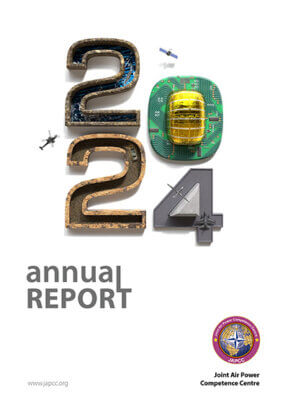Foreword
This edition of the Annual Report provides a comprehensive overview of the significant developments, projects, and research accomplished by the JAPCC in 2024. It also offers a glimpse into the exciting work we have planned for 2025 and beyond.
As the JAPCC Assistant Director, appointed in August 2024, I am honoured to carry forward the exceptional work of Paul Herber. It is with great pleasure that I present to you the 2024 Annual Report.
The last year has been intense, with the ongoing war in Ukraine, the conflict in the Middle East and various crisis worldwide. These developments have a direct influence on our work. Requests for JAPCC support from NATO entities and member nations have again remarkably risen, underlining the value of JAPCC’s significant contribution to the development of NATO Air and Space Power, and the acknowledgement of our work and competence.
2025 marks the 20th anniversary of JAPCC, the most senior among NATO accredited Centres of Excellence. This edition of the JAPCC Annual Report provides an overview of key developments, projects, and research done in 2024, while also highlighting plans for 2025 and beyond. Despite severe staffing challenges (with only 52% of the Subject Matter Expert positions filled) the JAPCC successfully supported many initiatives important to the Sponsoring Nations and the NATO Joint Airpower Community, including the Ramstein and Steadfast exercises series, significant studies and articles, custodianship of many important NATO publications, while actively participating in NATO Working Groups and Boards. Our JAPCC professionals maintain long-term focus on important projects, often with little fanfare or recognition. Much of JAPCC’s work and products are found under the metaphoric waterline of an iceberg.
As you will see on the following pages, your investment in the JAPCC delivers dividends for airpower and interoperability now and for years to come. JAPCC will continue to assess the present and study possible future scenarios, keeping NATO’s transformation through the Warfare Development Agenda and AIRCOM’s five priorities and operational needs as a guideline.
While the focus of this report is on our many accomplishments in 2024, allow me to take the opportunity to remind you of our manning challenges. I can only urge you – as our Sponsoring Nations – to consider filling the vacant positions of this important Centre of Excellence to sustain and uphold the quality of the JAPCC work, its utility, and value in a more and more challenging environment for our Alliance. I would like to particularly call your attention to our UAS and Counter-UAS efforts and 5th and future generation fighters and Autonomous Collaborative Platforms, with particular focus on the Collaborative Combat Aircraft programs as the expected most challenging field in the upcoming years.
Furthermore, long-vacant positions such as Knowledge Management and Public Affairs could have a significant impact on our mission without requiring another professional from the combat arms. As always, we are responsive to you, the Sponsoring Nations; what else can JAPCC do to help you make the difficult but essential decisions shaping the future of Joint Air and Space Power?
As former AIRCOM, USAFE, and AFAFRICA Commander and Director of JAPCC General Gorenc used to say: ‘Airpower is like Oxygen. When you have enough, you don’t have to think about it. When you don’t have enough, that’s all you can think about.’ It is also our job to keep us all breathing!
Sincerely,
Vito Cracas
Colonel Pilot, Italian Air Force
Assistant Director, JAPCC









